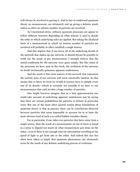will always be involved in getting it. And in fact in traditional quantum theory no measurement can ultimately end up giving a definite result unless in effect an infinite number of particles are involved.
As I mentioned above, ordinary quantum processes can appear to follow different histories depending on what scheme is used to decide the order in which underlying rules are applied. But taking the idealized limit of a measurement in which an infinite number of particles are involved will probably in effect establish a single history.
And this implies that if one knew all of the underlying details of the network that makes up our universe, it should always be possible to work out the result of any measurement. I strongly believe that the initial conditions for the universe were quite simple. But like many of the processes we have seen in this book, the evolution of the universe no doubt intrinsically generates apparent randomness.
And the result is that most aspects of the network that represents the current state of our universe will seem essentially random. So this means that to know its form we would in essence have to sample every one of its details—which is certainly not possible if we have to use measurements that each involve a huge number of particles.
One might however imagine that as a first approximation one could take account of underlying apparent randomness just by saying that there are certain probabilities for particles to behave in particular ways. But one of the most often quoted results about foundations of quantum theory is that in practice there can be correlations observed between particles that seem impossible to account for in at least the most obvious kind of such a so-called hidden-variables theory.
For in particular, if one takes two particles that have come from a single source, then the result of a measurement on one of them is found in a sense to depend too much on what measurement gets done on the other—even if there is not enough time for information travelling at the speed of light to get from one to the other. And indeed this fact has often been taken to imply that quantum phenomena can ultimately never be the result of any definite underlying process of evolution.




